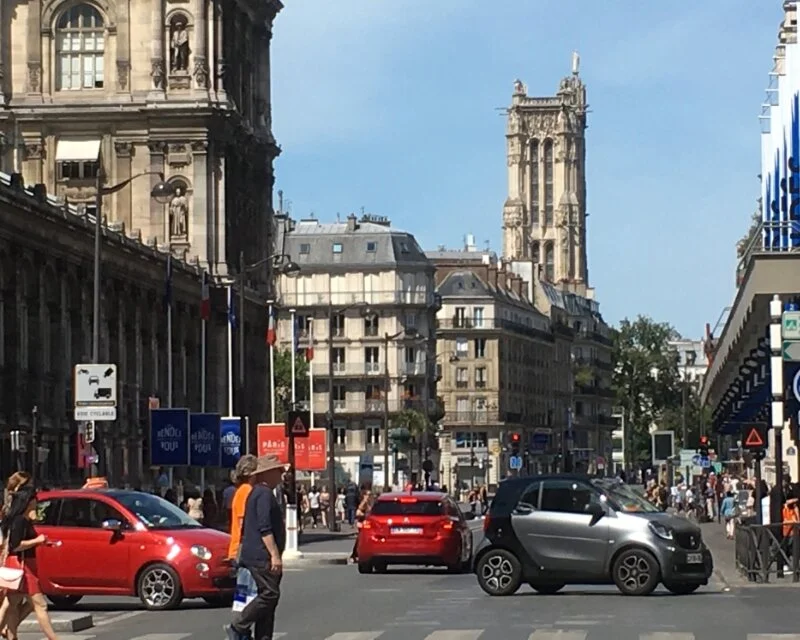Coeur
by Susan Weber
Determined not to miss my train I arrive at the station two hours early. I sit in Gare de Lyon’s chaotic main hall with a sightline to the big board. I’ll feel better when they post my train.
Everything I hoped to do here I’ve done. Paris is for lovers or at least for fond friends. It can bring out a person’s loneliness. But I was lonely before I got here—I don’t blame the city for that. Paris is for lovers of invention, too. It’s intriguing to look within and without through its monumental lens. Content with my adventures here, I scrounge in my pack for the writing tools.
“Pardon!” The slender man retrieves a large curved case that is skidding towards my knee.
“Pas de problème,” I venture. He sits down and speaks French very fast with words I do not understand. I ask if he perhaps speaks English.
Dark brown eyes and fluid brows tell me how very pained he is by his minimal mastery of English. I say the regret is mine for not knowing French.
"Qu'est-ce que c’est?” I ask, pointing to his instrument.
“A lute,” he says. And we are off and running.
Much later, on a train to eastern France, speeding past dry fields and scattered livestock, I reach for my pen. I see two musicians lean toward each other in the cavernous din to do what we do best—listen. I guess I’ll make some notes.
Algerian-French lute player. Solo and with others. Returning from concert in Guadeloupe, performs with a different group tomorrow in Toulouse (southern France via two trains). I teach him some English words. He teaches me these—
cheur (choir) pronounced the same as coeur (heart)
chanteuse on hearing I’m a singer
conteuse on hearing I’m a storyteller
roman (novel) on hearing I’m a writer
Mentions a psychoanalytic novel he read long ago. Remembers liking it very much. It’s by Karl Popper, set in Austria. He would look up the title but his phone died in Guadaloupe while visiting a waterfall. His friend slipped on the wet stones; he tried to help. He dropped his phone and now he needs a new one.
Has friends in the US but has never been there. One time he turned down a chance to play in New York City because the date conflicted with a concert on his schedule. Very interested in New York opportunity, but honored earlier commitment.
He grew up in Algeria. Family moved to France when he was grown. Studied Old French and Middle Eastern music. The two intersected when the Moors ruled parts of Spain for 800 years.
I ask about flags I saw at the rally yesterday in Place de la République. He says there are two. One for the country of Algeria, one for the Berber people. Another name for Berber = Amaziglis (free man). Expat Algerians meet in the square to protest for the people who cannot. I ask about pictures of prisoners at the protest. His voice is pained. Algerian government locks up leaders of dissent. No free press there either.
We talk about performing music. How an audience arrives as distinct individuals. How sometimes listeners connect through the music to each other. A strange but tangible—and not so rare—occasion. His train is boarding. Mine is boarding soon.
Music well performed can dissolve the walls between us. Sometimes language—expertly performed—can keep those walls in place.
In my first conversation in Paris, with my driver Marco, we spoke each others’ languages and got a lot wrong. We laughed and did our best and felt connected. If I’d spoken flawless French and he exquisite English, we might have had a polite but stilted exchange. In a playground kids race to the monkey bars and clamber up to join the other kids. Maybe stranger is a concept we acquire with age. Adults at a loss for language get to play their hearts out until trains take them off to their circumscribed worlds.
Here’s how two musicians say good bye in the great hall of Gare de Lyon. He gathers up his lute, his dead phone, his worn suitcase. She stands to hoist her pack. He asks if she plans to be in France often. She says she hopes so and takes the hand he offers. In so much more than words he says he hopes so too.
Photo Susan Weber CC BY-SA 4.0
